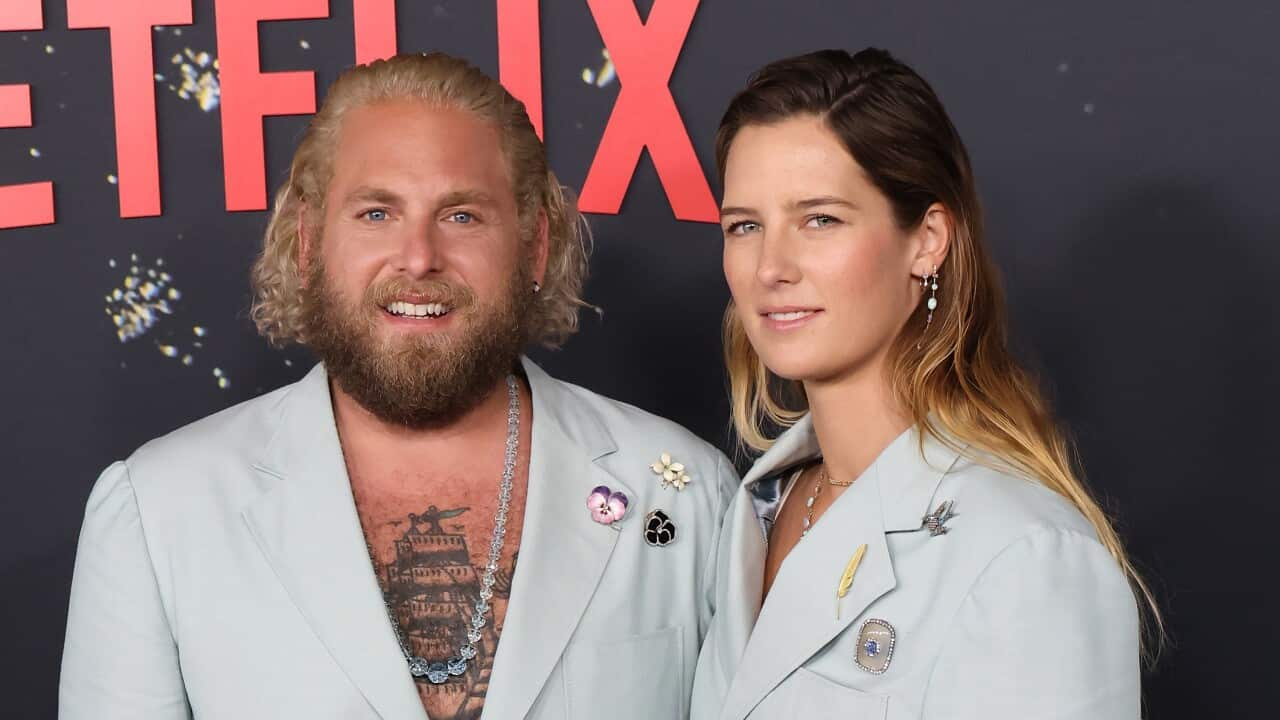Surfer Sarah Brady posted screenshots to her Instagram on Sunday accusing her ex-partner, actor Jonah Hill, of "emotional abuse" and "misogyny".
“This is a warning to all girls. If your partner is talking to you like this make an exit plan,” she wrote on Instagram stories.
In a series of screenshots that appeared to show texts they had sent each other, Hill repeatedly circled back one word: boundaries.
For Hill, who has been vocal about his mental health struggles and the support he's received, the release of the alleged texts has since stirred a conversation about the "weaponisation" of therapy talk.
What did the alleged texts from Jonah Hill say?
In the messages, Hill allegedly told his ex-partner if she needed "inappropriate relationships with men, to model, to post pictures of yourself in a bathing suit, to post sexual pictures," this would go beyond his "boundaries of a romantic relationship".
In later screenshots, Brady said she had removed three posts at his request, to which he allegedly responded, "good start". Brady said she had not yet removed a video that she described as her "best surfing video".
Sharing the exchanges, Brady captioned one of her Instagram stories: "See the misuse of the term 'boundaries'?"
In a recent post, Brady also uploaded a photo which she said she previously "took down by request of a narcissistic misogynist". She did not name Hill.
Boundaries versus control: Is "therapy talk" being misused?
Hill has been vocal about his mental health struggles and released a documentary about his therapist who he says "changed his life". The documentary Stutz was released in November, and the film and its maker Hill received praise for an honest portrayal of mental health.
At the time of its release, the 39-year-old halted promotion for the movie saying he was experiencing anxiety attacks.
The release of the alleged texts has since ignited a conversation about how 'therapy talk' is being appropriated by some.
Respect Victoria, a state government organisation for the prevention of violence against women, said in a tweet: "Telling a woman what she should wear, how she should do her job, isolating her from friends, and shaming her is not a ‘boundary.'
"The alleged texts from Jonah Hill to his ex-partner are clear examples of gaslighting and manipulation, dressed up as boundaries."
Psychologist Sahra O'Doherty, who has been practising for almost a decade, agrees.
"They might not also understand that the other person who they're requesting meet those needs actually has the right to say no," O'Doherty said.
In the past few years, therapy strategies such as self-care and boundary-setting have become common vernacular, as more people seek mental health care, she said.
Tiktok and Instagram therapists, some of whom have qualifications, have also dished out advice online to help people advocate for themselves and their needs.
She said it's been helpful and demystifying to popularise these mental health care practices, but sometimes these concepts are straying far from their original meaning.
What should we talk about when we 'set' boundaries?
Many therapists online have been reacting to the alleged texts from Hill negatively, pointing out that setting a boundary is not about dictating other people's actions, but instead knowing what is enough for you to say no to.
Jeff Guenther, a licensed counsellor also known as @therapyJeff online, said in a TikTok video: "The use of the term boundaries (in this case) is a misuse of the concept. A boundary is a healthy limit a person sets for themselves to protect their well-being and integrity.
"It is a rule or guideline that one creates to identify reasonable, safe and permissible ways for others to behave towards them and how they'll respond when someone passes those limits."
But in the messages Hill allegedly sent to Brady, Guenther said the actor is not setting boundaries. Instead, he is dictating "behaviours and friendships".
Others online have said the "therapy talk" is being used by some people to validate "selfish" actions, under the guise of prioritising mental health.
And in the case of Hill's alleged texts, O'Doherty said it's being used to validate "controlling behaviour".
"Potentially dictating who the person sees what the person does, what activities a person, is allowed to do or isn't allowed to do...they're not boundaries, they're rules," she said.
Brady posted further screenshots in which she addressed Hill’s struggle with mental health but said it was not an excuse for his alleged behaviour.
“I too struggle with mental health but I do not use it to control [people] like he did to me.”
O'Doherty said she's noticed more people coming to sessions using clinical terms. People are labelling others as "narcissists", misusing the word "triggering" and she's seen self-diagnoses of anxiety and depression.
Her job, she says, is to listen without judgement. She says she notes what is and isn't being addressed by the client, to get a broader picture of the narrative and how they're framing it.
"If they are framing somebody else in their lives through quite a negative lens, then it is part of my job to dig that little bit deeper, while also validating the emotional experiences of the individual in front of me."
But some people can misinterpret that contextualised feeling of validation and instead "blame others for their circumstance".
"And that's when it becomes dangerous."
If you or someone you know is impacted by sexual assault, call 1800RESPECT on 1800 737 732 or visit . In an emergency, call 000.
Readers seeking crisis support can contact Lifeline on 13 11 14, the Suicide Call Back Service on 1300 659 467 and Kids Helpline on 1800 55 1800 (for young people aged up to 25). More information and support with mental health is available at and on 1300 22 4636.
supports people from culturally and linguistically diverse backgrounds.
MensLine Australia offers free professional 24/7 telephone counselling support for men on 1300 78 99 78.



